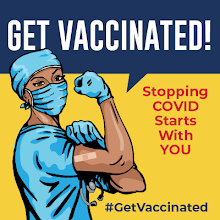Major Measles Outbreak Erupts In England As Vaccine Hesitancy Increases
"In England, the Birmingham Children’s Hospital is currently grappling with a major outbreak of measles. More than 50 children have been hospitalized in the past month. Vaccine-preventable diseases such as measles and polio remain a public health threat. And with childhood vaccine hesitancy—or simply outright refusal—on the rise in the U.K., U.S. and Europe, the problem is likely to worsen.
"The measles outbreaks in the U.S., including most recently in Philadelphia, are worrisome. But the situation appears to be more severe in England. There, cases have been surging. According to new figures released by the U.K. Health Security Agency there were 1,603 suspected cases of measles in 2023, which represents an increase from 735 in 2022 and 360 in 2021.
"The spike in cases is fueled by vaccine hesitancy towards the measles, mumps and rubella shot. According to National Health Service England, in December 2022 the MMR vaccination rate in the Birmingham region was around 83%. To optimally protect the population, a rate of at least 95% is critical.
"The disease causes an initial flu-like illness with symptoms that include a high fever of over 103 Fahrenheit (39.4 Celsius), copious congestion, red eyes and a rash that spreads around the entire body. Patients with measles can develop ear infections, severe gastrointestinal upset, pneumonia and brain swelling. It’s the latter that killed author Roald Dahl’s seven-year old daughter, Olivia, in 1962. This was before the advent of vaccines.. In 1986, Dahl penned an essay about her death as an appeal to parents everywhere to vaccinate their children.
"The launch of Covid-19 vaccines seems to have prompted more unwarranted concerns about vaccination.
"But the more people forego childhood immunizations, the greater the chances infectious diseases such as measles stage a comeback as we’re witnessing today. The now persistent problem of the return of vaccine-preventable diseases is a direct result of the steady increase in vaccine hesitancy lately.
"In the wake of the upsurge in measles in England, British doctors and government officials are posting urgent pleas to parents to have their children vaccinated."
-----------
My mother made sure her children were vaccinated for every disease, and I'm old enough to remember her telling us about Olivia Dahl's tragic death, which made an impact on all caring parents.
Those "parents" allowing their children to needlessly suffer from preventable diseases today makes me incredibly angry and ought to be considered child abuse.
=======================================
Excerpts from Eric Last, DO, at MedPage Today (subscription needed), who describes why primary care is in danger:
"Entering our fourth year of COVID, it's hard to believe some of the conversations I'm still having with patients. Last week in a telemedicine evaluation, a patient dealing with COVID for the first time lamented that he did not understand why so many people were sick or fathom how he even got COVID.
"When I asked when he'd received his last vaccine dose, he replied: 'Never, I don't believe in it.' He's a patient I've known for 20 years.
"Another patient with COVID called and said, 'The commercial says, 'If it's COVID....Paxlovid', so can't you just prescribe it?" She's currently on 10 different medications, so I explained to her that four of them would either need to be adjusted or held so that I could prescribe nirmatrelvir-ritonavir (Paxlovid). 'I never thought it was so complicated,' she responded.
"We are awash in illness, with COVID, influenza, and RSV spearheading the attack. Multiple other illnesses bereft of formal names are circulating as well. It seems that everyone we know is either sick, was recently sick, or has family who is ill. The headline-grabbing worry is that hospitals will again be overrun, a real potential in a world where simple public health measures are seen as infringements on our rights; where vaccine uptake is pathetically low; and where it is as easy to be exposed to misinformation as it is to contract a respiratory-borne illness.
"None of us ever want to see a return to the nightmare days of lines of waiting ambulances and refrigerator trucks laden with the dead outside our hospitals. At Northwell, we had more than 3,400 hospitalized patients with COVID at the height of the pandemic in April 2020. Today, while it's higher than it's been for a while, it's at a more manageable number, just below 500.
"However, there is a real crisis: Primary care is buckling under the strain of this season of illness.
"Already bearing the burden of retirements, staffing shortages, and daily administrative demands, primary care is the front line of not just epidemics, but of healthcare itself. Because of that, the added stress of this influx of patients will push many practices to the breaking point. No amount of scheduling can add hours to the day, and our workload only becomes more burdensome as we and our office staffs become ill too.
"The lack of trust in experts who really do know better about the effectiveness of vaccines is worsened by the ongoing opposition to masking, and while some hospitals have implemented a mask mandateopens in a new tab or window, many others have not.
"It has also impacted our ability to take care of patients who need care for their regular issues, to diagnose new and complex medical conditions, and to conduct routine annual physicals. That's where our current situation quickly becomes unsustainable.
"Eventually, springtime will come, waves of illness will run their course, and we will return to a baseline of illness and wellness.
"In the meantime, we all hope that emergency departments, general hospital beds, and ICUs will stand the strain. But remember that the foundation of the system, primary care, is in danger."
-------
What a sad state of affairs that after 4 years of COVID, the ignorance of patients is still jeopardizing the doctors who have to take care of them.











.jpg)
No comments:
Post a Comment